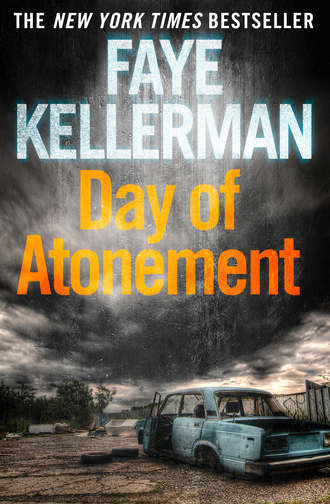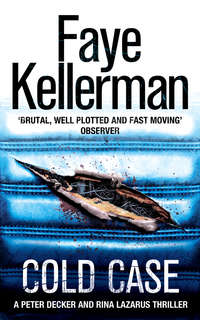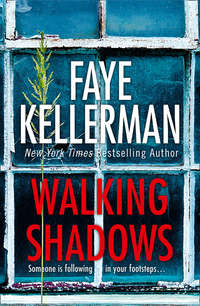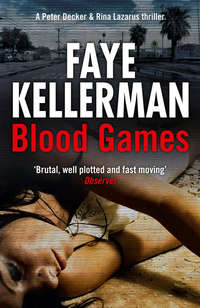
Полная версия
Day of Atonement

Faye Kellerman
Day of Atonement
A Peter Decker/Rina Lazarus Novel

Dedication
To my brothers—Allan Marder and Stan
Marder—who teased me, but taught me
Contents
Cover
Title Page
Dedication
Prologue
Part One: Tephila—Prayer
Chapter 1
Chapter 2
Chapter 3
Chapter 4
Chapter 5
Chapter 6
Chapter 7
Chapter 8
Chapter 9
Chapter 10
Chapter 11
Chapter 12
Chapter 13
Chapter 14
Chapter 15
Chapter 16
Chapter 17
Part Two: Tzedakah—Charity
Chapter 18
Chapter 19
Chapter 20
Chapter 21
Chapter 22
Chapter 23
Chapter 24
Chapter 25
Chapter 26
Chapter 27
Chapter 28
Part Three: Tshuvah—Repentance
Chapter 29
Chapter 30
About the Author
Also by Faye Kellerman
Predator
Copyright
About the Publisher
Prologue
He wrote down the name Hank Stewart. Stared at it for a while and decided it was a good start.
A start.
But not there yet.
He wrote Dr. Hank Stewart. Then: Hank Stewart, M.D.
But hell, doctors were nothing special. Matter of fact, they were assholes, all puffed up and full of themselves.
So he wrote Hank Stewart, ESQ.
Crossed that off the list. Lawyers were bigger assholes than doctors.
How about Hank Stewart, Nuclear Physicist.
Or Hank Stewart, Nobel Prize Winner.
Give ’em a smile as they took his picture.
Hell with that. That kinda fame was too short-lived. A picture in a newspaper for about a day. Big effing deal.
Hank Stewart, CIA.
Stewart—Superspy.
Good ring to it.
Ah, that was stupid. Kid stuff.
Still, kid stuff was better than peddling fish.
I’ll take one pound of snapper, please.
Yeah, lady. Right up your ass.
The old people always buying fish ’cause they didn’t got no teeth to chew meat. They came up to the counter, moving their mouths over their dentures, whistling the word “snapper,” their hands and head shakin’, looking like they wasn’t glued together very tight.
That was the worst part. Working behind the counter.
Now the gutting part was okay. Especially once you got the feel for it, didn’t let the suckers slip out of your hands.
Fish were slimy little bastards, all the gook would get over your clothes and you never could get the smell out. Thing to do was just work in smelly clothes for a while, then chuck ’em in the garbage.
Or stuff ’em in the mailbox of that jerk who was giving you a real hard time.
Now if he was a real asshole, you’d stuff some fishheads in with the smelly clothes.
Good old fish. Flopping in the pail, looking up at you with glazed-over eyes sayin’ “Put me out of my misery, man.”
At first he used to do it just like the old man did. Cut the gills. But then he found a better way. He’d step on their heads.
Stomp!
All the brain squishing out.
That part was okay, too. But the best part was the swim bladder. Bounce it with the tip of the knife. Careful, careful. It was delicate.
Bouncy, bouncy, bouncy.
Then if you were quick enough, you’d jam the tip all of a sudden and it’d pop.
But that was kid stuff, too. Old stuff. He’d moved on to better stuff than popping swim bladders. And things were going real good until he got caught.
Hell with that shit. No sense moaning about the past. Better to make something of the future.
After all, he was young.
He wrote Hank Stewart, Real Estate Developer.
Like that guy who owned all those casinos in Atlantic City. Man, he could have his pick of chicks ’cause he had bread.
Hank Stewart, millionaire.
Hank Stewart, billionaire.
Hank Stewart, trillionaire.
Ah, that was stupid, too. Money wasn’t everything. It didn’t show what you got in your pants.
Hank Stewart, stud.
Ah-hah!
Hank Stewart, rock star. Hair down to his ass, wearing nothing but a pair of tight jeans, sweat streaming down his hard, lean body. Girls coming after him, screaming their little heads off, waiting for him to give it to them.
Hank Stewart, King of Rock and Roll.
He paused a moment, then wrote: Hank Stewart, King.
King Stewart.
Emperor Stewart.
Lord Stewart.
God Stewart.
Or just plain God would do.
1
Brooklyn.
Not the honeymoon Decker had imagined.
Twelve grueling months before he’d rack up another two weeks’ vacation time and here he was, alone in a tiny guest bedroom, his long legs cramped from having slept on too small a bed, his back sore from lying on a wafer-thin thing that somebody had mislabeled as a mattress. He’d bunked up in foxholes that had been bigger than this place. Most of the floor space was taken up by the pullout sofa bed. The rest of the furnishings were worn pieces old enough to be antiques, but not good enough to qualify. A scarred wooden nightstand was at his right, the digital clock upon it reading out ten-forty-two. The suitcases had been piled atop an old yellowed pine bureau adorned with teddy-bear appliqués. The sofa pillows had been stuffed into the room’s only free corner. On the east wall, two wee windows framed a gray sky.
The honeymoon suite.
Très charmant.
Two days ago, he’d danced blisters on his feet, whooping his voice raw, carrying his stepsons around on his shoulders. It had been a wild affair—the drinking and dancing lasting until midnight. Now his body was paying overtime for his exuberance.
Of course, the undersized sofa didn’t help.
He chewed on the ends of his mustache, then pulled the sheet over his head.
They say Jews don’t drink much, but they’ve never seen ultra-Orthodox rabbis at a wedding. The men downed schnapps like water. Decker had thought his father had a large capacity for booze, but Dad was a piker compared to Rav Schulman.
Dad and Mom. Sitting in the corner, wondering what the hell was flying. Cindy trying to coax Grandma to dance. Rina did get Mom to dance once. Even Mom couldn’t turn down the bride. But that one time had been the only time.
Well, at least they came. A big surprise and a step in the right direction. They liked Rina, he sensed that immediately. Rina could charm anyone and she was truly a nice person. But his parents couldn’t come out and tell him they liked her. Mom did admit that if he had to marry another Jew, Rina seemed like a decent woman. Very high praise. Then she added that Rina seemed sincere in her beliefs even though they were dead wrong.
Randy had liked Rina, too. Baby Bro liked all beautiful women, but he wasn’t what you’d call a picky sort. Decker wished he could have spent some more time with Randy—shoot the bull about the job—but he and Rina just had to rush off. Had to make it to Brooklyn before the holiday of Rosh Hashanah started.
What was he doing, honeymooning in Boro Park of all places? He and Rina should have been in Hawaii, making love in the moonlight on the beach. Hell, he would have settled for staying back home on the ranch—just him and her. Send Sam and Jake off to visit Grandma and Grandpa in Brooklyn for the holidays.
But no, no, no. Rina had to visit her late husband’s parents. His luck: to inherit not one but two sets of in-laws.
Decker stretched, his feet falling over the edge of the mattress.
At least her ex-in-laws were nice people.
So happy you joined us for the holidays, they had said. Rosh Hashanah will be a wonderful New Year’s with Rina and the boys and you as guests in our home. Thank you so much for allowing us the pleasure of being with you.
But Decker hated looking into their eyes. He could tell what they were thinking.
Why couldn’t you be our son, Yitzchak?
He ran his hands through damp ginger hair.
It had to be tough on them. Their only son gone, he the stepfather of their boy’s children.
He wished he was back home. Too many ghosts here.
The clock glowed ten-forty-five. He hadn’t heard Rina wake up, but he knew she wouldn’t dare abandon him. She was probably in the kitchen helping her ex-mother-in-law prepare for the big holiday meal.
His clothes weren’t visible. They’d been thrown off in the heat of passion last night, both of them stifling laughter, hoping the flimsy bed could take all the weight.
Afterward, Decker wondered if Rina had made love with her late husband in this very bed. But he had kept his thoughts to himself.
Finding the energy to rise, he immediately tripped on his shoes, stubbed his toe, and cursed silently. He stripped off his pajamas, went over to the bureau and found that Rina had unpacked, his clothes neatly stowed in the first and second drawers. She’d put his Beretta under a pile of undershirts, the clips all the way in the back under his pants. God bless an efficient woman.
He attempted to open a door on the west wall. It came out about halfway before it hit the bed frame. He squeezed himself inside the cell and found a munchkin-size bathroom—sink, shower, and toilet. The water closet was done in old white tile and reeked of disinfectant, but someone had laid out clean towels. He took a quick lukewarm shower (others had gotten to the hot-water tank before him), his elbows hitting the walls as he soaped up. He had to duck a good foot to get his head under the shower tap.
He dried himself off and dressed, his skin prickly with goosebumps. There was no room to stand and dress with the bed unfolded. He straightened the sheets and pushed the mattress inward until it slid down into the sofa frame, then put the pillows on the couch.
A little more space, but he’d have to do his waltzing elsewhere.
He put on gray gabardine trousers, a white dress shirt, and a pair of black oxfords. People around here just didn’t wear sweats. Strapping his belt around his waist, he felt lighter of weight without his shoulder harness and gun. And a little more vulnerable, too. He found a black yarmulke, bobby-pinned it onto his hair and quickly said Shaachrit—the morning prayers. Then he went downstairs to face what was in store for him.
He swore he’d be in a good mood. He swore he’d be friendly. But he felt grumpy, his leg muscles still bunched. His throat was tight, a sour taste had coated his mouth.
Relax.
No one was in the living room. It, too, was small, walls and moldings painted ivory and hung with dime-store landscape prints. The carpet was green shag, worn nearly flat. The couches were off-white velvet, the arms covered in plastic as were the lampshades. The room might have been described as old and musty had it not sparkled with crystal. On the coffee table, on the end tables, in a breakfront, in the connecting dining room. Decanters, vases, bowls, and goblets. Some of the glasswork had been intricately cut, catching the overcast light from outside and breaking it into thousands of colors. Other pieces were clear or etched—tinted deep iridescent shades.
All the crystal was smudge-and-dust-free. With the kids out of the house, this had to be mama lion’s pride.
The dining-room table had been extended until the top practically abutted the living-room couch. Enough seating for forty people. The entire downstairs was filled with cooking smells—the aroma of roasted meats, spicy puddings, and fresh-baked bread and pastries. Decker realized his mouth was watering.
High-pitched magpie sounds emanated from the kitchen. With all their chatter, the women hadn’t heard him come down. He stood at the kitchen doorframe waiting for someone to notice him. Rina’s ex-mother-in-law, Sora Lazarus, saw him first. She was a small, compact woman with large brown eyes and thick lips. Her hair was pinned under a big kerchief and she had spots of flour on her face. She wore a white chef’s apron and smiled at him, bursting into ooing sounds he interpreted as a welcome.
“Did you sleep well?” Sora Lazarus asked.
“Yes, thank you.”
Rina emerged from the back, wiping her hands with her apron. She smiled at him and he immediately melted. She was exquisite even in a loose housedress. Sapphire eyes, inky-black hair, creamy complexion, full, red lips. Not to mention those curves. And now, she was officially Mrs. Decker. Two long, long years. But she was worth the wait.
She led him into the belly of the kitchen. The place was hot and misty. Most of Rina’s hair was covered by a kerchief, but a few steam-limp strands had escaped and framed her lovely face. She slipped her arm into his and hugged his bicep.
“Akiva, I’d like you to meet my sisters-in-law, Esther and Shaynie.”
Decker found it amusing that she had called him by his Hebrew name. Only in Boro Park. Back home, he was plain old Peter. He nodded hello to the women, but knew better than to try to shake their hands. Men and women in this culture didn’t touch unless married, and even then public displays of affection were frowned upon. But Rina seemed to disregard this little bit of tradition and Decker was glad she did. He smiled at the sisters—women he’d spoken to many times on the phone. He said, “Nice to finally see the faces that go with the voices.”
They both smiled back and immediately averted their gazes.
He put Shaynie at about his age—forty-one or -two. She was petite, with a long face, amber eyes, and warm smile. She wore no makeup, but her cheeks were rosy from the heat. She was married to Mendel, an accountant.
Esther was also small, but heavier than her sister. Her face was fuller, her arms thicker. She had the same amber eyes as her sister and also wore no makeup. But her face wasn’t rosy, it was blood red. Her eyes rested on her feet.
And Decker knew why. Three months ago, her husband, Pessy, had been arrested in a massage-parlor raid in Manhattan. Through the police grapevine, Decker had found the proper connections and managed to spring the guy, expunging all the charges from the computer. He had mixed feelings about it. The guy was a first-class scumbag—had come on to Rina while she lived in New York. Clearing this little mishap meant he owed favors to some brothers in the NYPD. And he didn’t like being in the red.
But the Lazarus family had been grateful, though no one had ever explicitly told him so. It was just implied that they were grateful because everyone was suddenly more respectful to him whenever he called Rina.
Another little piece of dirt neatly swept under the carpet.
Sora Lazarus said, “The men already went to the mikvah. You want me to take you there?”
“Let’s let it go this time, Eema,” Rina said.
It was customary for men to go to the ritual bathhouse before the high holidays. But the idea of bathing in communal water made Decker squeamish. He gave her an appreciative smile.
Sora Lazarus said, “Then maybe you’d like some breakfast? A cup of coffee?”
“A cup of coffee sounds great,” Decker said.
“Then you sit at the table,” the little woman said. “I’ll get you some coffee and a little pastry—”
“Just coffee, please,” Decker said. “Black.”
“Black?” Sora Lazarus said. “No milk? No sugar?”
“Just black,” Decker said. “Please.”
“Rina,” Sora Lazarus said, “sit with your husband. I’ll bring you some coffee, too.”
“I’ll get it,” Rina said.
“Don’t be silly,” chided Sora Lazarus. “Sit.”
A moment later they were alone in the dining room, sipping coffee at a table fit for a mess hall.
“The Lazaruses are having a bit of company?” Decker asked.
“Thirty-six people. Not including the kids’ table.”
“A small intimate meal.”
“It’s tradition,” Rina said. “My mother-in-law always has the Levine family over on the first night of Rosh Hashanah; we go over to the Levine house for lunch the next day.”
“How many Levines are we talking about?”
“Rabbi and Mrs. Levine, their five children and who knows how many grandchildren. And Mrs. Levine’s parents. They must be in their eighties by now.”
“Is everyone going to talk in Yiddish?”
“The grandparents do, but the five kids are our age. The oldest must be a few years younger than you. Shimmy—nice guy, good-looking, too.”
“You notice these things.”
“I’m religious but not blind.”
“Well, you’d have to be nearsighted to marry me.”
“You’re fishing for compliments, I’ll give you one,” Rina said. “I think you’re gorgeous. Or as they say in Brooklyn, gohjus.”
Decker said, “Am I as gohjus as Shimmy?”
“Better,” Rina said. “Shimmy—like you—has a good sense of humor. I think you’ll like him.”
“I can feel a friendship brewing.”
“Oh, cut it out.” She punched him in the shoulder. “Mrs. Levine’s youngest son, Jonathan, is—believe it or not—a Conservative rabbi.”
“A rebel in the midst.”
“You make light, but his father’s heartbroken.”
Decker shook his head. “That kind of reactionary thinking is incredible to me.”
“That’s because you don’t understand what it represents to Jonathan’s father. Conservative Jews don’t believe that oral law is as important as written law. So oral law—which is holy to us—can be changed by man. That’s a major break, Peter. Even though Jonathan is pretty traditional in his own practices, his father feels that Jonathan has rejected him and everything he believes in.”
“Is that what you think?”
“I don’t agree with Jonathan, but I know he’s sincere. And although I understand Rav Levine’s feelings, I feel bad for Jonathan. His father makes this big show of not speaking to him—unless they’re arguing Jewish law. Mrs. Levine ignores his hostility and invites Jonathan to every holiday meal. It’s uncomfortable at first, the father addressing Jonathan in the third person. ‘Can someone ask Mister Levine to pass the flanken?’ Mr. Levine, mind you, never Rabbi Levine. It’s become sort of a joke by now, but I know it makes Jonathan feel lousy.”
“And here I thought this was going to be boring.”
Rina smiled. “Jonathan’s mother is more tolerant. You’ll like her, Peter. She and Mama Lazarus are best friends. She’s as feisty as they come. She was a legal secretary for the criminal court system in Queens for years, always worked, which was very unusual for Orthodox women her age. Being a cop, you two will probably have lots to talk about.”
“Yes, we can talk about assholes”—Decker smiled—“excuse me—miscreants.”
“You’re going to have to watch that.”
“No problem, honey,” Decker said. “I don’t intend to talk much.”
“I know this is very hard for you,” Rina said. “A lot of change in the last couple of years.”
“True ’nough, woman, true ’nough.”
Rina hesitated, then whispered, “Are you happy?”
“Ecstatic.”
Rina looked at his deadpan expression. “I’m serious.”
“So am I.” Decker took her hand. “From the bottom of my heart, I couldn’t be happier. I love being married to you.”
“Good,” Rina answered. But her expression was troubled. “Do you like being an observant Jew?”
Decker said, “I wouldn’t have converted if I didn’t like it.”
“You didn’t convert.”
“You’re talking semantics,” Decker said.
“You’re right,” Rina said.
Technically, he hadn’t converted. His biological mother had been Jewish, which made him Jewish according to Hebraic law. But having been adopted in infancy, he considered himself a product of his real parents—the ones who had raised him. And they had brought him up Baptist.
“You’re a doll, Peter,” Rina said. “A wonderful sport. I’ll make it up to you.”
Decker felt a tightening below his belt. “I’ll keep you to your word.”
She kissed the tip of his nose. “Want more coffee?”
“No, thanks,” Decker said. “Maybe I’ll take a walk. Want to join me?”
“Wish I could,” Rina said. “But there’s still a slew of work to do in the kitchen.”
“Have fun.”
“You, too. Bundle up. We’re having a weird cold spell. Enjoy, Peter.”
Yeah, Decker thought. He’d just have himself a ball.
2
He always hated this time of year.
The holidays.
It reminded him of fish.
Fish was real big this time of year, especially fish heads. Yum-yum, fish heads. And then there was ground-up fish—everyone wanting to make gefilte fish.
No carp, just white and pikefish.
Just whitefish.
Just carp.
Just carp and pikefish.
Can you put in some bread crumbs?
Can you put in an onion?
More onion.
Less onion.
No onion.
Fuuuuuuucccckkkk you.
Carp were disgusting fish, smelling like garbage. They were bottom feeders so they ate a lot of shit. You are what you eat.
Open up carp and hold your nose. Finding all sorts of gunk inside them. Grit and sand and dirt and lots and lots of worms, especially if they’d been fished out of polluted waters. Sometimes he’d find pop tabs or bottle caps. Sometimes green bottleglass.
If he really hated the old lady, he’d grind the glass up with the fish.
A crunch delight.
Fuuuuuuccccck you.
Piss on the holidays.
They also reminded him of the family.
Piss on the family.
The holidays. They were supposed to inspire fear, but for him, all the prayers and shit were just simply … shit.
Last year on Yom Kippur, he woke up and ate a cheese sandwich.
Old God didn’t strike him dead like they said He would.
Then he jacked off.
God didn’t strike him dead.
Then he went out and drank a few beers, cussed with the guys, whistled at the chicks. Just hung out.
God didn’t strike him dead.
Then he had a pepperoni pizza for lunch.
God didn’t strike him dead.
Then he rented a porno video and whacked off again. Two times. Man, he was a stud.
God didn’t strike him dead.
Why should God strike him dead?
He was God.
Or something close.
3
The streets of Boro Park vibrated with an air of urgency even though most of the local businesses were closed for the day. Black-clothed men marched along the avenues, middle-aged ladies toted sacks of groceries, picking up last-minute forgotten items. Young married women wrapped in winter coats were swept along with harried grace. Some wore woolen caps, but most wore wigs—the common look being locks of straight hair that fell to their shoulders, the ends curving inward, a modified pageboy. The pink-nosed women pushed loaded-down strollers along the walkways, their progeny bundled in layers of blankets to the point of near-invisibility. Decker didn’t know if it was the unseasonable cold or what, but everyone was hauling down the streets as if fighting to make a curfew.
He stuck his hands in his overcoat pockets and told himself to slow down. He had nowhere to go, nothing to do. He tightened a tan cashmere scarf around his neck. It had been a gift from Rina—a waste of money since L.A. weather rarely necessitated scarves. But he knew she’d spent a lot of time picking it out so he wore it whenever he could. On his head was a skullcap instead of a hat. In most circles, the yarmulke would mark him as Jew. Here a mere yarmulke marked him as a “goy.”









